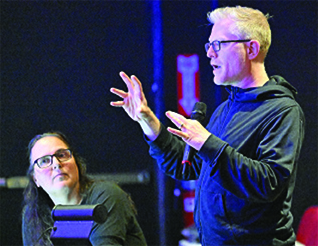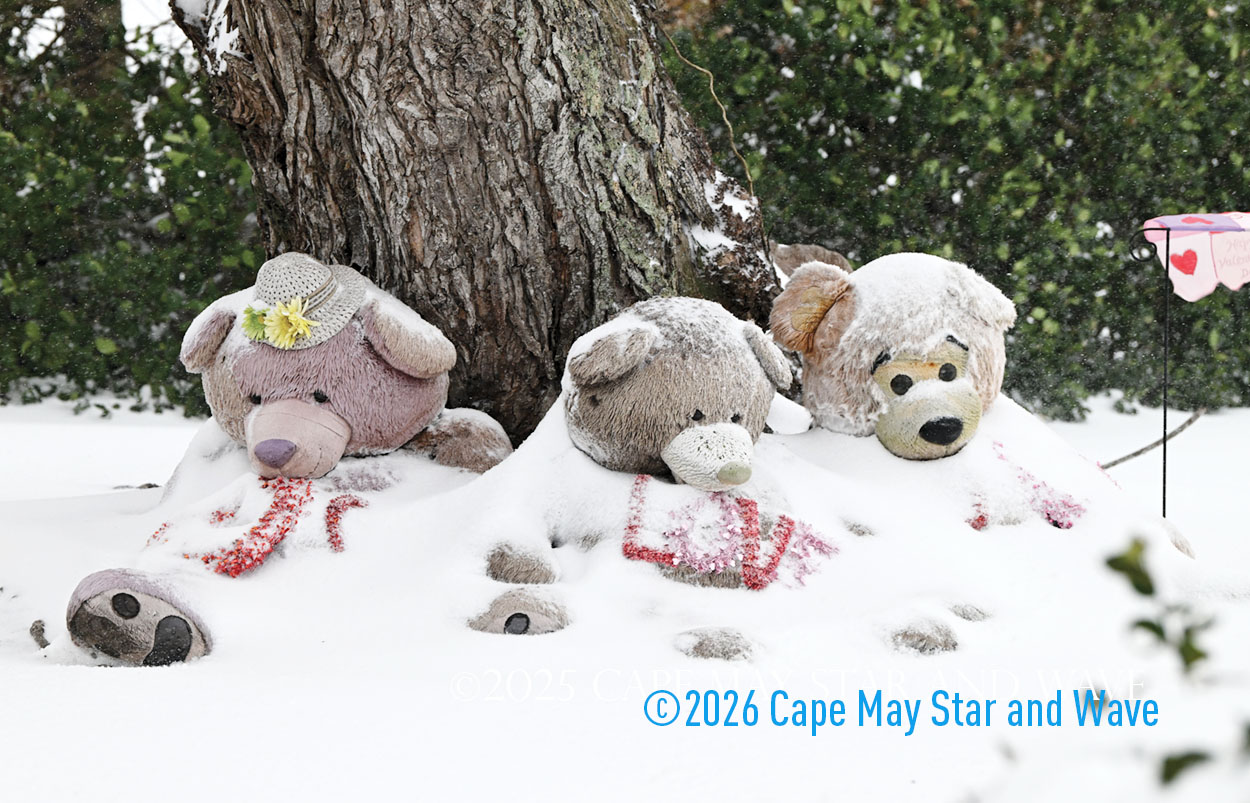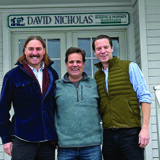Anthony Rapp: Q&A on favorite roles, fan overlap, acting career
SOMERS POINT — Actor Anthony Rapp provided students in the Gateway to the Arts program at the Gateway Playhouse in Somers Point an intimate look at the musical they’re about to perform in August — “Rent: School Edition.”
Rapp broke away to do a morning workshop July 2 at the Gateway while performing a series of shows with friend Adam Pascal at 54 Below in New York City called “Celebrating Friendship & History.” Before rushing back for an evening performance, Rapp sat down with the Sentinel for a Q&A about why he took time out to be with students, advice he’d give to young people interested in an acting career, the overlap between theater fans and “Star Trek” fans, and roles that have been important to him as an actor.
Rapp, 53, originated the role of Mark Cohen in the Broadway musical “Rent,” reprised it in the film version and the show’s U.S. tour.
The Chicago native first performed on Broadway when he was 10 years old, appearing in “The Little Prince and the Aviator.” He has published a memoir about his mother and “Rent” entitled “Without You: A Memoir of Love, Loss, and the Musical Rent.”
Rapp has extensive theater credits, was in the movie “Dazed and Confused,” has appeared on television in episodes of “The X-Files” and “Psych” and starred for five seasons as Lt. Commander Paul Stamets, the first openly gay character on the series “Star Trek: Discovery.”
Why take time to come down here to the Gateway Playhouse?
“Since I was a young person, I’ve always been treated with respect and comradeship by the adults that I got to work with, so when I have the opportunity to try to give at least a little bit of that back to young people, it’s something that I very much enjoy doing. It’s meaningful to me. It’s a way of paying it forward.
“And with ‘Rent’ in particular, I feel it’s so important that Jonathan Larson’s work and the seeds that he planted continue to sprout and grow. I’m very happy that it continues to be done, and I have gotten asked to do more of these (workshops) than I can do because of timing and location. When it worked out that I was in New York at the same time and we could make this happen, it was an easy yes.”
What were you imparting to students in the Gateway to the Arts program?
“To me, this show demands and depends on a sense of community, and a sense of the group coming together to tell a collective story … that you really know what you’re singing together. Where you start the phrase and end the phrase is really important, that you do that with conviction as that sort of unified energy.
“If you’re singing in unison, that you know what exactly you’re singing together, if you’re singing in harmony, same thing that every part is important.
“I think it’s true of all music, really, but in this show in particular, the music is so well written that each song has its own kind of vibe and approach, and if you can really embrace that vibe of that particular song, it can be so helpful to really being able to just let go and go with it.”
What would you tell kids who are interested in going into acting as a career?
“The career is incredibly fickle and there are lots of ups and downs. I would encourage people to always have things that helps sustain them in the ups and downs, things that help feed their souls and spirits, because the business can be spirit-challenging sometimes.”
Rapp suggested they have hobbies, then corrected himself to suggest they have passions — “having things that feed your heart and soul because the ups and downs of the business can be a storm to weather sometimes.
“The external measures of success are not always the measure of whether or not you’re a great artist. There are plenty of artists throughout the course of history, of all kinds of art forms, who have had middling or no success in their lifetimes, and then sometimes have gone on great success after they die, for instance.
“The pursuit is about becoming the best artist you can be, and hopefully, yes, you can find success in that, but that’s not the only measure of whether or not you’re a great artist.”
What is the importance for young people having parental support?
“I don’t know anything different from my own life. My mom was incredibly dedicated and helpful and made sure that I had all the opportunities. I was the one as a kid who was really eager to pursue this as a career. She was a single mother, a nurse, and she did whatever she could to learn on the fly.
“I was very fortunate. I know that that’s not true of all kids, and I understand, too, as a father myself now. I have toddlers, they’re not at all in this stage of life, but I can understand the concern and fear about your kids taking risks and, you know, maybe setting themselves up for a life that might have some more challenges in it, but at the same time, I would encourage parents to consider supporting their children and pursuing their loves.
“And then, of course, trying to help them also have pragmatic concerns taken care of as much as possible. You can have certain kinds of, we call them survival jobs a lot of times in showbiz. Like if you’re between acting gigs, sometimes you need to get a survival job as a waiter or a temp job or in catering or you can teach yoga or you can teach acting.
“There’s all different ways you can do it that you can find ways to pay your bills and support yourself and still have room and space for your art. I would encourage parents to support their children in pursuing their passions, as well as having an eye on trying to make ends meet.”
Your IMDB is so diverse. Do you have a favorite genre?
“Being on stage, performing live with a live audience is my favorite. But of the film and television work I’ve done — ‘Dazed and Confused’ is my favorite film — and then getting the chance to bring a character to life over the course of seasons, which is the first time I’ve ever gotten to do that, which was with ‘Star Trek Discovery,’ that was a huge gift that I never even thought might be possible in my life.”
Among his many credits, he appeared on an episode of the “X-Files.”
“That was fun. I wasn’t able to watch much TV at the time because I was doing “Rent,” but ‘X-Files’ was one show that I was managing to watch at least some of and I was a fan. When I got to do an episode of it, it was pretty fun, pretty cool.”
What’s the difference between theater fans and “Star Trek” fans?
“It’s interesting. I’ve been doing conventions now as part of being a part of the ‘Star Trek’ universe. In film and television, normally you don’t get much of an opportunity to meet your audience. Occasionally, if I’m walking down the street somebody stops me, but being at a convention is more like being at a stage door, where you get to actually come out and people get to talk to you and share with you their feelings about the work that you’ve been a part of.
“This may or may not be surprising, but I feel like there’s a huge Venn diagram of where ‘Star Trek’ and ‘Rent’ fans meet. There are a lot of fans of both that I’ve met. A lot. It’s anecdotal, but I’ve encountered a lot of people who love both.
“And I’m not surprised by that because they both are pieces that speak to the greater good and the higher self and coming together in the face of challenges to find solutions. Both pieces of art are highly anti-cynical, so I’m not surprised that there are people who really love both.
You’ve talked about that Venn diagram with fans of “Star Trek” and “Rent” overlapping. Did you find that similar kind of overlap with the casts of both shows?
“Very much so. In ‘Star Trek’ in particular, our lead, Sonequa Martin-Green, just epitomizes what it means to be like a good citizen of a workplace. She brought in the most positive energy every day. And when you have that in a TV or film environment, they call it the number one of the call sheet. They have a lot of power.
“Whether it’s declared power or sort of assumed power, and when she comes in with having that kind of power and it brings that kind of positive energy, it just permeates the whole thing and it makes everybody happier and more relaxed and more free to be themselves and to work well together.
“Everybody embraced that. In both cases, that’s what we all brought to the work. And it made being at work much more than work.”
Yours was the first openly gay character on a “Star Trek” series. What did that mean to you?
“It was amazing to be a part of breaking the mold and helping build on this incredible legacy that ‘Star Trek’ has had for all these decades. And it was kind of like a bonus thing for me in my life that I’d never thought that I’d be a part of.
“I was always a ‘Trek’ fan and a ‘Star Wars’ fan and like a nerd fan of all kinds of things. I never pictured myself in them. So then to be in it and not only in it, but also then representing in this way was incredibly meaningful — and to do so with my longtime friend, Wilson Cruz, who was also a ‘Rent’ alum.” (Rapp and Cruz portray a couple on the series.)
“I first met (Cruz) in person when he was a part of ‘Rent.’ He replaced Angel on Broadway, but the tendrils of it, the roots of it go very, very deep.”
What was good about also developing their relationship in the series? There seems to be a retrenchment in this country on issues such as gay rights. Was it important sharing that normalcy on “Star Trek Discovery”?
“I think that visibility has always been the thing that’s made forward movement possible, so any visibility is really deeply important. And of course, a retrenchment or a backlash is only reactive to progress, so there’s been a tremendous amount of progress over the last few decades. Now there’s this pushback because there’s been so much progress made.
“Status quo was always going to fight for itself. So, yeah, I think that stories like ours, stories like ‘Rent’ being told again now, ‘Angels in America,’ any part of the history of these movements, I think is really important for these to continue to be told.
“And I do think it’s harder to push back against people, push back against a group of people when they’re individuals or stories that can reach people’s hearts. I think it becomes a little harder to do that. At least that’s the idealistic part of me that believes that.”
You sing, you’ve written a book, you’ve written a one-man play, you’re in theater, television, movies. What do you look for when you’re trying to pick out roles?
“It’s not only one thing. It’s like, if when I encounter the material, if it speaks to me, if I feel like pulled in by it, that’s especially exciting.
I mean, I’ll do almost anything. There would be certain kinds of roles that I don’t think I would do if the piece itself is representing something that I deeply don’t believe in, but I think most art isn’t doing that these days.
“You know, if there’s some art that’s terrible, racist propaganda, I wouldn’t be a part of that. But if there was a piece that was about racism and I was asked to play a racist person to help tell that story that was critical of racism, I would play that part, which I have done.”
“So it’s work that has meaning, that’s resonant, that speaks to me, it could also be lighthearted and fun, but just that I feel some kind of ineffable connection with. That’s what I hope to find when I encounter material. And I would hope that I get to continue to work with people who are collaborative, interesting, good people, who treat each other with respect and kindness, and try to do really good work together.”
By DAVID NAHAN/Cape May Star and Wave



